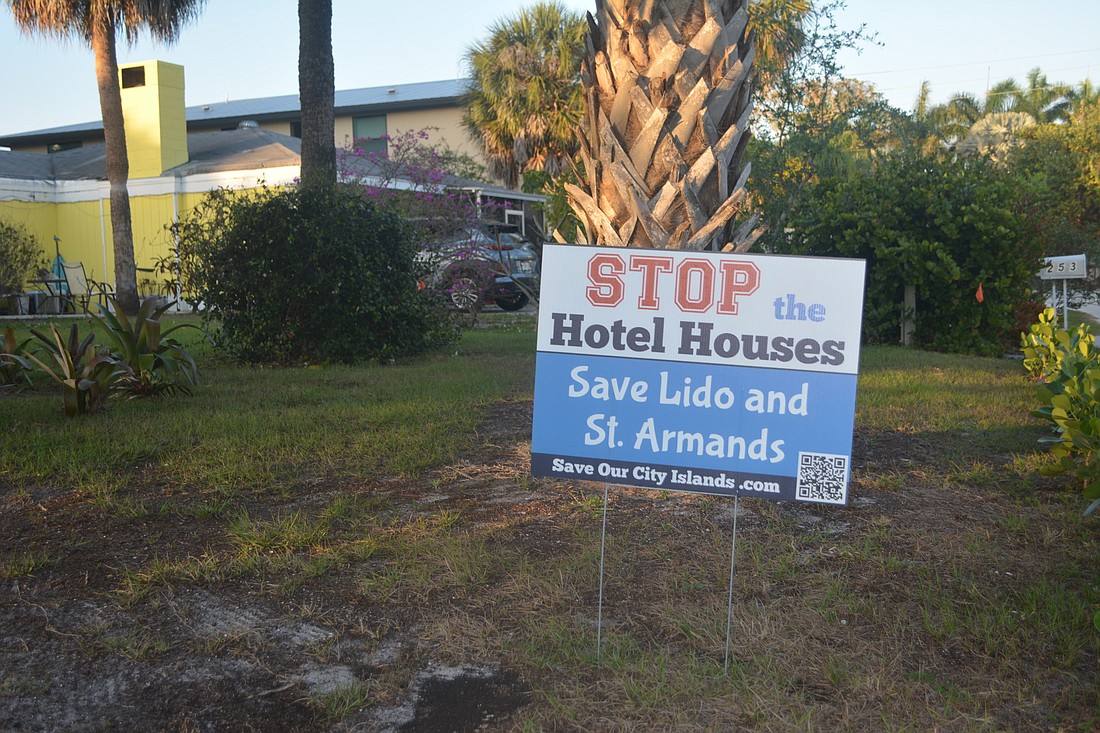- April 9, 2025
-
-
Loading

More than a year after individuals living on St. Armands and Lido keys called on officials to address issues attributed to large vacation rentals in residential areas, the City Commission approved a series of new regulations April 6 responding to those concerns.
After a series of votes sorting through specific provisions, the commission voted unanimously in favor of an ordinance establishing an occupancy limit, registration requirement and other regulations for vacation rentals in barrier island neighborhoods. The board must approve the ordinance on second reading at its May 3 meeting before the regulations take effect.
Although commissioners disagreed on some of the details of the ordinance, the board hoped the capacity requirement and other rules could meaningfully mitigate problems with vacation rentals on the barrier islands. In late 2019, residents said the presence of large rental properties — which the St. Armands Residents Association called “hotel houses” — was an unwelcome intrusion of commercial activity that generated noise, parking issues and other challenges.
Chris Goglia, president of the St. Armands Residents Association, said he was happy to see the ordinance advance in an email to the group following the meeting.
“It is the outcome that we desired and that we have worked so hard on for so long,” Goglia wrote.
Prior to the final vote, the commission eliminated some rules contained in a draft version of the ordinance, including a cap on the number of visitors allowed at a rental property during the day and a requirement to provide identifying information regarding all guests staying at homes with six or more bedrooms. Although a majority of the board believed the stricken regulations were unnecessary, commissioners Jen Ahearn-Koch and Kyle Battie felt it represented a dilution of the initial proposal.
“Piece by piece, we’re picking away at this ordinance and it’s becoming less and less effective,” Ahearn-Koch said.
The board was also split on some provisions that remained in the ordinance, such as a requirement to inspect registered rental properties once every four years. Commissioners Erik Arroyo and Hagen Brody said they felt some of the regulations were overly restrictive and went beyond the issues residents attributed to large vacation rentals in their neighborhood.
“If I had to write this ordinance, it would have just said, ‘Reduce the decibel requirements so there is an easier trigger to issue citations, and you have to park in a parking lot.’” Arroyo said. “I think that would have solved 95% of all the complaints.”
Following the final vote, Ahearn-Koch indicated her interest in expanding the ordinance to apply citywide. Arroyo and Brody expressed their opposition to implementing all of the regulations included in the ordinance on the mainland. City Attorney Robert Fournier said such an expansion would require a new series of public hearings, and the commission agreed to revisit the topic on May 3.
During the commission’s discussion, Brody asked Fournier whether the city could be subject to legal action from landowners who allege the new regulations represent a taking of their property rights. Fournier said he believed there could be claims filed under the state’s Bert J. Harris Jr. Private Property Rights Protection Act., though he also thought the city could make a reasonable defense against any claims. Fournier added that such claims could be settled by granting property owners a temporary exemption from the ordinance to make up for any loss in property value.
“You have to authorize whether the city would settle those claims or fight those claims,” Fournier said.
When the city of Anna Maria passed regulations on vacation rentals in residential areas, property owners filed more than 70 claims under the Harris act, all of which ended in a settlement, Fournier said. Battie said he believed the city would not see the same volume of claims — and that the regulations approved April 6 would discourage the proliferation of problematic rentals in residential areas.
“I don't think we necessarily have to concern ourselves with that, because we're not Anna Maria Island,” Battie said. “We're trying to sort of head that off at the pass.”